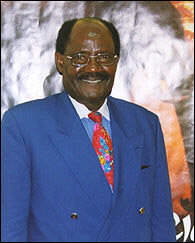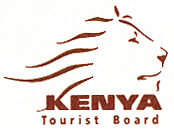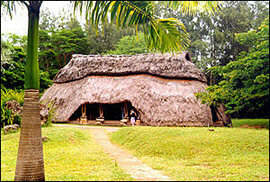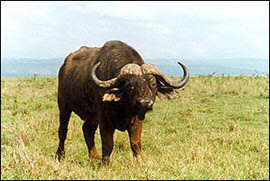
|
 |

Interview with:
Mr. Eliud Mahihu,
Ex-Chaiman
Nairobi, June 17th, 1999
Contact:
PO Box 306320, Nairobi, Kenya.
Tel: +254 (2) 604245 / 6
Fax: +254 (2) 501096
Email: ktb@form-net.com
|
Can you briefly tell us the history of Kenya Tourism Board, and what role is it to play in the development of tourism?
Kenya Tourist Board is a creation of the stakeholders involved in tourism. It was created two years ago by presidential order. Basically KTB coordinates the activities of the tourism business community in a way that we can bring together the private sector and the government. The board is mainly driven by the private sector. It has thirteen members, eight of them from the private sector. The government has three main members in the board: the Permanent Secretary to the Treasury, the Permanent Secretary in the Ministry of Tourism and the Permanent Secretary in the Office of the President in charge of Internal Security. The representation from the Government is critical to the board. KTB operates under the umbrella of the Ministry of Tourism, although it is private sector driven and it makes its own decisions. The Chairman of the board does not have veto power.

The main purpose of the board is to promote Kenya as a country, in the International market as an international destination. It also tries to promote domestic tourism. The board is charged with the responsibility of ensuring that Kenya remains a major competitor in the world of tourism.
We have just carried out a study together with the European Union that gives very interesting statistics. Tourism represents 9.2% of the Gross National Product per annum and 18% of all foreign exchange earnings. It serves to stabilize the balance of payment, that is why the Tourism sector is to important to the Kenyan economy. It is a big employer in itself, both direct and indirect. In 1996 it provided about 11% of the Government levies.
The sector is presently under a recession. What efforts is your board doing in order to promote tourism in Kenya? What are the results, and what are the prospects for 1999 and the year 2000?
Towards the end of 1997, we had a crisis, a disturbance in the Coast, which affected the major tourist resorts. These disturbances attracted the international media, which in turn turned into negative publicity which affected bookings. This negative publicity. You have to know that the bed capacity is 32,000 in the coast alone. This bad press went on until mid-1998. The board then decided to go to the market source, i.e. to Europe, to reverse the trend. The action taken by the board appears to have been positive. Kenya's image is changing.
What about the American market, are you trying to tackle it too?
We take the American and Canadian markets very seriously. We have met with the main tourist market stakeholders and agreed on future plans. We have tour operators who operate in Kenya and the United States. The number of our American guests has continued on an upward trend. We do not envisage any more negative publicity, even though the American Embassy bomb blast affected us. Fortunately, we had a very good understanding between our international tour- operators and ourselves that it was a terrorist act. We received very few cancellations. It did not seriously affect our tourism. | Kenya is suffering increased competition from other African countries. Can you comment on that?
Kenya has been a tourism leader in Africa, especially South of the Sahara. The release of Mandela was kind of an opening for South Africa. Everybody was curious and looked to that country as something new. Zimbabwe enjoys considerably movement from South Africa. In the early sixties and early seventies Kenya was the leader in tourism without any competition. People have now realized that there is money to be made in tourism. We are unique in the sense that we have wildlife. We believe the combination of wildlife and beaches will continue for a long time to be our trademark, both overseas and locally. People want to come and stay in the resorts at the Coast, and also go on Safari. Not all countries have that combination. The opening up of the East African Cooperation, and the opening up of COMESA will stabilize the competition. The consolidation of East Africa Cooperation will give Kenya Tourist Board a bigger opportunity to expand it operations to Uganda and Tanzania. If there are no restrictions, then one can go to Zambia, Uganda, Malawi, Zimbabwe, Tanzania, etc. If the tourists can go to any of these countries, then, naturally, the turnover will increase.
In which way do the Kenya Tourist Federation and the Kenya Tourist Board clash. Donīt you think there is a multiplication of organizations in the Kenya tourism sector that are fighting to do the same thing?

Kenya Tourist Foundation is a body that is supposed to bring together all the private sector bodies, e.g. KATTO (Kenya Association of Traveling Tour Operators), the Hotel Keepers Association, The Mombasa and Coast Tourist Association, etc. They can speak a language we cannot speak, since we are also ruled by the government. We are restrained in certain areas. They have no control by the government so, for instance, they can complain in the press. It is healthy for the Kenya Tourist Foundation to exist because they deal with problems the Kenya Tourist Board cannot deal with as a government body. Kenya Tourist Board is responsible for marketing and promoting Kenya as a destination. We are donor funded for marketing, we are also accountable to the Government and to the stakeholders. We do not promote individual hotels, we promote Kenya, the wildlife and beaches as a general concept.
Any final message for our readers?
Kenya Tourism is on the move, this is because we are united in this cause. We are still unique. We are on the equator. We hope that in the new millennium we will have a drumming up on the equator. And we hope that the tourists can come and enjoy our hospitality. |
|
© World INvestment NEws, 1999.
This is the electronic edition of the special country report on Kenya published in Forbes Global Magazine.
November 29th 1999 Issue.
Developed by AgenciaE.Tv |
|
| | | | |
| |
|

